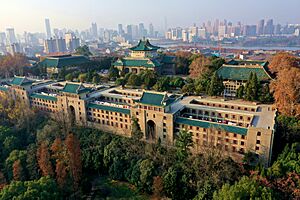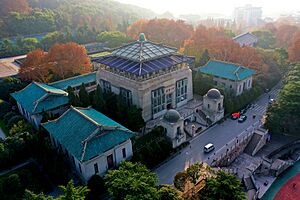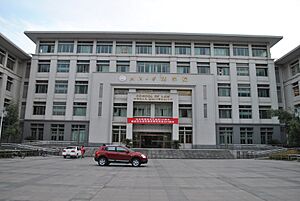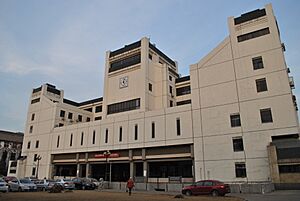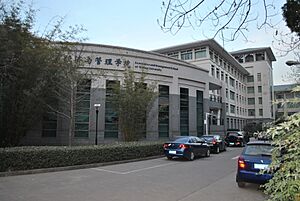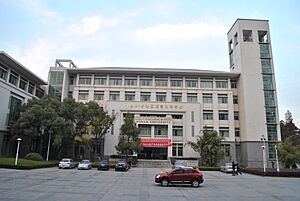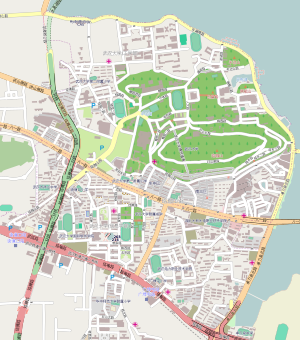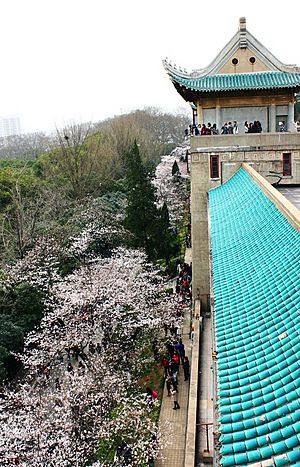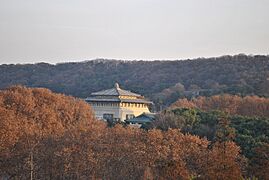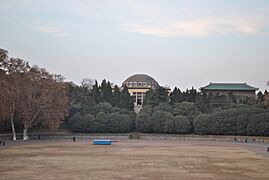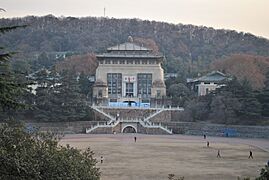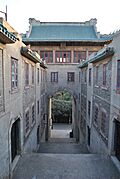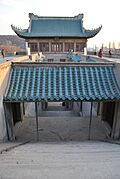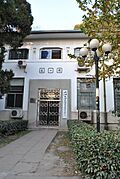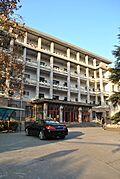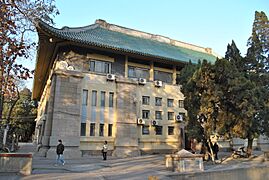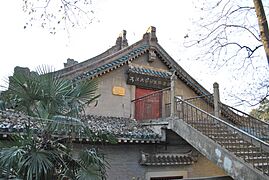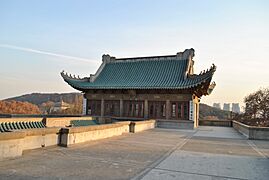Wuhan University facts for kids
|
武汉大学
|
|||||||
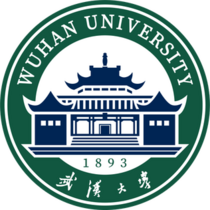 |
|||||||
| Motto |
自强 弘毅 求是 拓新
|
||||||
|---|---|---|---|---|---|---|---|
|
Motto in English
|
Self-improvement, Perseverance, Truth-seeking, Innovation | ||||||
| Type | Public | ||||||
| Established | 1893. Reformed as university in 1923. | ||||||
| President | Zhang Pingwen | ||||||
|
Academic staff
|
7,325 | ||||||
| Students | 58,720 | ||||||
| Location |
,
,
China
|
||||||
| Campus | Urban, 3.5 km2 | ||||||
 |
|||||||
| Chinese name | |||||||
| Simplified Chinese | 武汉大学 | ||||||
| Traditional Chinese | 武漢大學 | ||||||
|
|||||||
Wuhan University (often called WHU) is a large public university in Wuhan, Hubei, China. It gets its funding and support from the Ministry of Education of China. The university is part of important national plans like Project 985, Project 211, and the Double First-Class Construction, which aim to make it a world-class university.
Contents
History of Wuhan University
Wuhan University has a long and interesting history. It started in 1893 as the Ziqiang Institute.
In 1926, several schools in Wuhan joined together to form the National Wuchang Sun Yat-sen University. This new university had many subjects, including liberal arts, science, law, economics, and medicine.
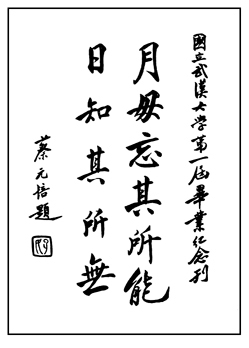
Two years later, in 1928, the government officially created the National Wuhan University. It had four main colleges: liberal arts, law, science, and engineering.
After 1949, the university was taken over by the Communist Party and became known simply as Wuhan University.
Academics and Students
Wuhan University is a very big school! In 2018, it had over 29,000 students studying for their first degree (undergraduates). It also had nearly 20,000 students working on their master's degrees and over 7,000 students studying for their Ph.D. degrees. Plus, more than 2,400 students came from other countries to study there.
University Rankings
Wuhan University is known as one of the best universities in China and around the world. Many groups that rank universities place it very high.
Rankings in China
Wuhan University is often ranked among the top 10 universities in China. For example, in 2016, one ranking group, CUAA, placed it as the 4th best university in the country.
Global Rankings
Globally, Wuhan University is usually in the top 200 universities.
- In 2022, the QS World University Rankings placed it 194th in the world and 8th in China.
- U.S. News & World Report ranked it 150th globally in 2022.
- The Academic Ranking of World Universities put it between 101st and 150th in the world in 2022.
- The Times Higher Education World University Rankings ranked it 157th in the world in 2022.
Wuhan University is also seen as one of the most respected Chinese universities by the Times Higher Education World Reputation Rankings.
Research at WHU
Wuhan University is also strong in scientific research. The Nature Index 2023 ranked it as the 14th best university in the Asia Pacific region for research. It was also ranked 33rd in the world among all global universities for its research output.
Campus Life
Wuhan University has a beautiful campus. It is located near the scenic Luojia Hill and the lovely East Lake. The campus has many trees and green spaces, with flowers blooming all year.
The university is famous for its cherry blossom garden. Every spring, a cherry blossom festival is held, attracting many visitors.
Many of the stylish old buildings were designed by F. H. Kales. He was good at mixing Western building styles with traditional Chinese designs, especially in the roofs.
The campus covers a huge area, about 5.5 square kilometers. The university's libraries have a collection of about 5.4 million books and subscribe to over 10,000 different magazines and journals.
Working with Others
Wuhan University works with over 300 universities and research centers in more than 40 countries.
- The School of Information Management at Wuhan University signed an agreement with the Royal School of Library and Information Science in Denmark in 2009.
- Wuhan University also worked with Duke University and the city of Kunshan to create Duke Kunshan University.
Famous Alumni
Many successful people have graduated from Wuhan University. As of 2017, at least 29 billionaires had graduated from the university.
- Guo Moruo, Chinese author and poet
- Bin Jiang, professor in GIS
- Chen Tanqiu, Chinese revolutionary
- Shen Congwen, Chinese writer
- Wen Yiduo, Chinese poet and scholar
- Li Long Lam, archaeologist
- Li Siguang, founder of geomechanics
- Ling Shuhua, Chinese modernist writer
- Wan Exiang, professor of international law
- Wang Yanyi, Chinese immunologist
- Su Xuelin, Chinese author and scholar
- Xiaokai Yang, Chinese-Australian economist
- Wang Tieya, Chinese jurist and judge
- Li Haopei, Chinese jurist and diplomat
- Chao Yao-dong, Taiwanese politician and economist
- Wu Mi, one of the founders of Chinese comparative literature
- Chi Li, contemporary Chinese writer
- Zheng Lihui, Chinese gymnast and Olympic gold medalist
- Xiao Hailiang, Chinese diver and Olympic champion
- Li Da, Chinese philosopher
- Karim Massimov, former Prime Minister of Kazakhstan
- Lei Jun, founder of Xiaomi Tech
- Liu Jingnan, GPS engineer
- Xiaolin Wu, computer engineer
- Yi Zhongtian, writer and historian
- Tiare Aguilera Hey, Rapa Nui politician
- Wang Zhi'an, journalist and TV host
- Chiao-Min Chu, engineer
See also
 In Spanish: Universidad de Wuhan para niños
In Spanish: Universidad de Wuhan para niños
 | Claudette Colvin |
 | Myrlie Evers-Williams |
 | Alberta Odell Jones |



